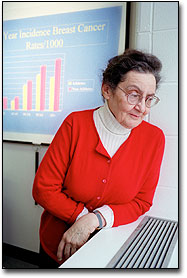Exercise reduces cancer risk

Being an athlete in college can win women a competitive edge against breast cancer, according to a new Harvard study.
A 15-year follow-up of 3,940 female athletes and nonathletes revealed that the less active women had significantly more breast cancer than the more active women. Most of those in the study were graduates of Radcliffe College.
“The effect was more marked among women younger than 45 years,” says Grace Wyshak, an associate professor at the Harvard School of Public Health and the Harvard Medical School. She and colleague Rose Frisch estimate that exposing women to physical activity during their college years or earlier may decrease the risk of breast cancer in women of all ages by 17 percent. That would reduce the 180,000 new cases reported in the United States each year by 30,600. For women under age 45, the proportion of breast cancers that might be prevented is even greater.
Wyshak cautions against extrapolating such striking findings to all women who exercise diligently. “Were dealing with fairly small numbers here, only 64 cases of breast cancer among the athletes and 111 among nonathletes,” she notes. “Theres nothing in our data to suggest that you would get the same results from following a heterogeneous group of women who currently exercise regularly. However, Ive looked at more than 20 studies, and the weight of evidence suggests that regular physical activity does offer some protection against breast cancer.”
The protection evidently comes mainly from a lessened exposure to estrogen. Like all athletes, those in the Harvard study had later menarche, earlier menopause, and were leaner at all ages than the nonathletes. Numerous studies have shown convincingly that these factors reduce levels of estrogen.
Gathering Evidence
The Harvard study began in 1981 when Rose Frisch (now associate professor of population sciences emerita) and Wyshak sent more than 7,000 questionnaires to alumnae from eight colleges and two universities. Most of the responses came from Radcliffe and its sister colleges: Barnard, Bryn Mawr, Holyoke, Smith, Vassar, and Wellesley.
Answers came back from more than 5,000 women divided almost equally between athletes and nonathletes. An analysis completed in 1985 by Frisch, Wyshak, and their colleagues provided the first solid evidence that regular exercise during high school and college years significantly reduces risk of breast cancer.
The new study, a 15-year follow-up on these women, is based on 3,940 responses to questions about occupation, current exercise, weight gain or loss, family history of cancer, other medical conditions, diet, alcohol intake, reproduction, menstruation, menopause, mental health, and estrogen therapy. The result strongly confirms the lifetime advantage of participating in organized athletics before and during college.
Its a particularly important finding at a time when more and more women participate in organized college sports. According to the Harvard School of Public Health, women now comprise almost 40 percent of college athletes.
“Overall, women in the study remain more physically fit in comparison to the general public,” Wyshak observes. “Even among nonathletes, 60 percent of those in their fifties exercise regularly. Among former athletes in this age group, its more than 70 percent.”
Both athletes and nonathletes smoke less and weigh significantly less than the general public. “Excess body fat raises the risk of breast cancer,” Wyshak notes.
She and Frisch point out that the athletes may carry significantly less body fat than nonathletes of the same weight because muscles weigh 10-16 times more than fat. Frisch led a study showing that young athletes have 30-40 percent less fat at the same weight as nonathletes.
Exercise Doesnt Get You Down
Wyshak is now looking at the data thats been collecting since 1981 to see if she can find what effects physical activity has on depression and diabetes.
Preliminary results show, as expected, that exercise protects women against adult-onset diabetes. Other studies have reached the same conclusion for both men and women, and its well known that being overweight produces the opposite effect.
“However, exercise does not seem to play a role in juvenile diabetes,” Wyshak points out. “That form of the disease is heavily influenced by genetics.”
Preliminary results also indicate that physical activity during college years provides some protection against depression.




